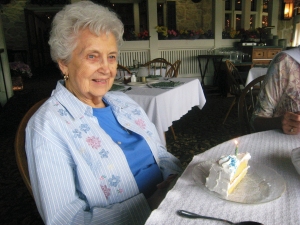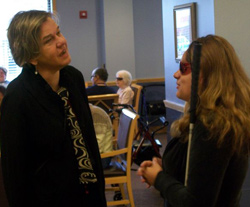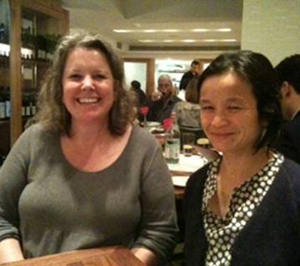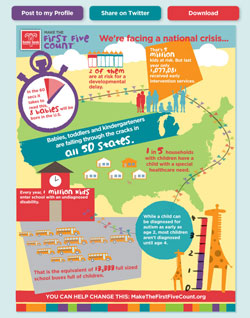by Beth Finke
 My mother — I call her Flo — just celebrated her 96th birthday, and with Mother’s Day coming up, today’s post is in honor of Flo.
My mother — I call her Flo — just celebrated her 96th birthday, and with Mother’s Day coming up, today’s post is in honor of Flo.
Flo has always been unpretentious and uncomplicated to a fault. I am the youngest of seven, and when I asked her once why she wanted such a large family, she said, “well, really, I always wanted just two children.” Her first-born was my sister Bobbie; the second, my brother Doug. The perfect little family.
“What happened?” I asked.
“Hmmmmm,” she said, thinking, then answered with a laugh, “too many parties, I guess.”
Flo’s grandparents were farmers who emigrated from Germany in the late 1800s, settling 15 miles west of Chicago in a town called Elmhurst. The farms had been replaced with post-war housing developments and expressways to the city by the time I was born. The Elmhurst home Flo and my dad, Eddie Finke, had invested in had been intended for a family of four. By the time I was born, there were no bedrooms left. My crib stood in the hallway until I was two. Not long after seeing to it that all his children were shoehorned into proper bedrooms, my dad had a heart attack at home. My sister Bev, six years old then, remembers him leaning on the closet door in his bedroom and clutching his chest. I slept through it all. I was 3 years old. I remember very little about him and it took years to find out anything else. Every time I asked, someone started crying, so I learned not to ask. Sometimes when we drove by the funeral home I’d call out, “that’s where Daddy lives!”
Eventually, Flo went to work. Daddy had switched jobs shortly before his death and had no life insurance. She got Social Security, but it wasn’t much. Before I started kindergarten, she took a job at a bakery, where I could go with her. I played and ate fresh bread and donuts in the back room while she waited on customers. When I started afternoon kindergarten, one of the other ladies at the bakery walked me to the crossing guard at noon.
My brothers and sisters had already taught me to read, and when my teachers discovered this, they tested me to see if I should skip ahead to first grade. I was tall enough, my test scores were high, and administrators knew my mother would have an easier time of it if I went to school all day. I was promoted at winter break. Flo started taking typing classes in an adult education program and studied for her high school diploma. Shortly after I turned seven, she took her first full-time job as a clerk in a nearby industrial town, a job she’d keep for the next 20 years.
It was during her first summer working that I was diagnosed with Type 1 diabetes. Decades later, the chronic illness would leave me blind. At my diagnosis in 1966, I was hospitalized for two weeks. Flo couldn’t miss work, but every morning and evening she’d stop by to see me on her commute.
So Flo was a single mom and we three youngest were latchkey kids long before those terms were commonplace. Our other brothers and sisters were married or out working by then, so Flo, Marilee, Bev, and I took care of the house, mowed, cleaned out the gutters, did makeshift repairs. Dinner was always ready when Flo got home; we lived what we considered happy, normal lives.
Flo never complained about things being hard or unfair. She did complain when we didn’t do our chores or if we fought over dishwashing duty or messed up what she’d just finished cleaning. But she never told us we were a burden or that we’d worn her out, though plenty of evenings she just went to her room and lay down. When we went in to ask if anything was wrong, she’d say, “no, I’m just resting my eyes.”
 Flo was still working when I graduated from college, fell in love and got married. She had retired by the time our son Gus was born, and when he was diagnosed with a genetic defect, she became the cheerleader for him that she’s always been for me.
Flo was still working when I graduated from college, fell in love and got married. She had retired by the time our son Gus was born, and when he was diagnosed with a genetic defect, she became the cheerleader for him that she’s always been for me.
I was visiting my son’s special ed classroom when another young mother struck up a conversation with me. Eventually we got around to what my family had been like when I was growing up. “Oh, so that’s where you get it,” she said after I described Flo.
“Get what?”
“Your courage,” she answered.
I was flattered, but had to chuckle. Flo would have been embarrassed. She didn’t believe she was being courageous. She saw her life in simple terms: she did what she had to do. And I realized that I look at my own life that way.
And so, in honor of Flo, we’re keeping this Mother’s Day celebration simple — taking her out for dinner at her favorite local diner in time for the early bird special. I’m adding a little pizzazz this year: having ProFlowers deliver a flowering plant, too — she’ll appreciate that $10 of the purchase will be donated to Easter Seals, an organization she’s known all her life. I can picture Flo caring for the plant day-to-day, marveling at how it grows. Under her simple, methodic care, her Mother’s Day plant will blossom and thrive — just like we all have.
 This story on ABC Action News in Tampa Bay made the rounds at the Easter Seals headquarters office one afternoon. We were all captivated by this adorable 6-year-old volunteer. She wanted to help out, so her mother called several organizations before Easter Seals Florida said yes.
This story on ABC Action News in Tampa Bay made the rounds at the Easter Seals headquarters office one afternoon. We were all captivated by this adorable 6-year-old volunteer. She wanted to help out, so her mother called several organizations before Easter Seals Florida said yes.







 I was a bad cook when I could see. That didn’t change when I lost my sight. I still can’t cook, but now, I have an excuse.
I was a bad cook when I could see. That didn’t change when I lost my sight. I still can’t cook, but now, I have an excuse. Reading about people with autism gives me perspective as an autism professional, and stories shared by parents provide fabulous insight, too. One parent that I have followed for years is
Reading about people with autism gives me perspective as an autism professional, and stories shared by parents provide fabulous insight, too. One parent that I have followed for years is  Move over, Kate Middleton,
Move over, Kate Middleton,  My mother — I call her Flo — just celebrated her 96th birthday, and with Mother’s Day coming up, today’s post is in honor of Flo.
My mother — I call her Flo — just celebrated her 96th birthday, and with Mother’s Day coming up, today’s post is in honor of Flo.
